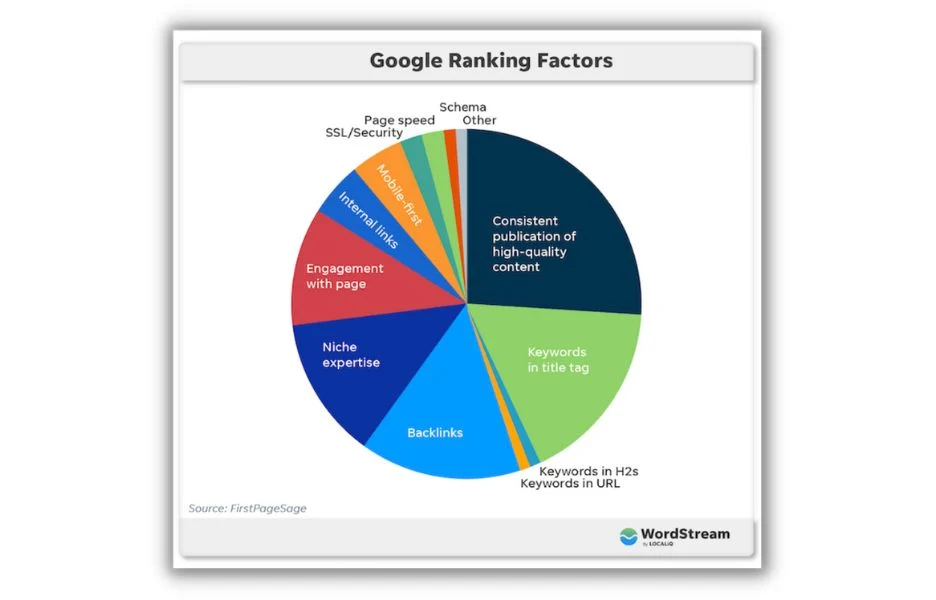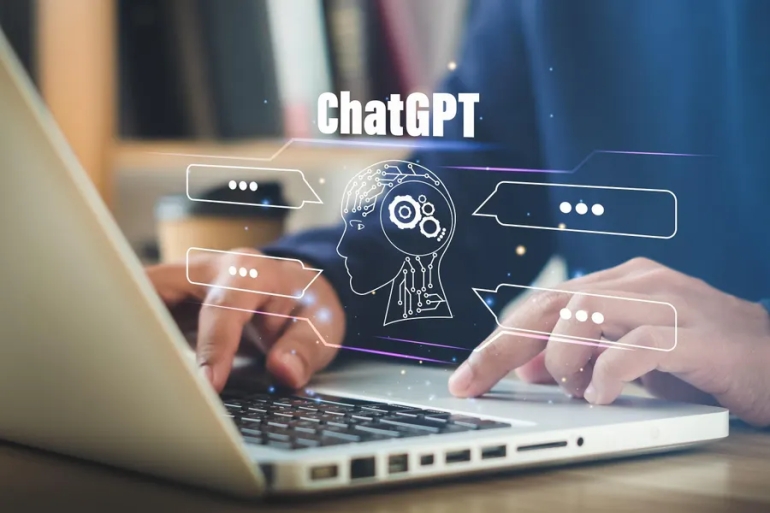In a March 2023 blog post, Microsoft founder Bill Gates hailed ChatGPT as “the most important advance in technology since the graphical user interface.”
This bold claim has resonated throughout the tech world, but its implications for marketing remain a subject of intense debate. Will ChatGPT revolutionize how we connect with consumers, or will it fade into the background like other once-hyped technologies?
We asked 20 marketing experts to share their predictions.
ChatGPT’s Impact on Marketing: A Content Creation Revolution?
One of the most immediate impacts of ChatGPT is its ability to rapidly generate content, streamlining marketing campaigns. From blog posts to social media updates, ChatGPT can create a wide range of written material.
“The best part? It won’t replace you, but work with you, almost like a marketing assistant,” says Hayley Mollett, Marketing Coordinator at Better-IT.
However, Tasos Banioras, Digital Marketing Manager at Tab.gr, cautions against relying solely on AI-generated content. “Otherwise, every marketer out there will end up with the same, or similar, ideas,” he warns. Instead, Banioras suggests using ChatGPT as a supplementary tool for brainstorming and inspiration, ensuring content remains unique and human-centric.
ChatGPT: Revolutionizing Marketing Through Data Analysis and Personalized Experiences
ChatGPT’s impact extends far beyond content creation; it’s poised to revolutionize how marketers use data and engage with customers. This AI tool offers unprecedented opportunities to streamline processes, personalize experiences, and gain valuable insights. We explore how marketing experts are already leveraging ChatGPT to transform their strategies.
Unlocking Data’s Potential: Smarter Insights, Faster
ChatGPT’s ability to analyze data and generate actionable insights is proving invaluable. “It can help identify trends, predict consumer behavior, and personalize marketing messages to a degree previously impossible,” says Kacper Rafalski, Demand Generation Team Lead at Netguru.
This sentiment is echoed by Carlos Barros, Marketing Director at Epos Now, who highlights ChatGPT’s capacity to provide deeper product and service insights. Chris Morris, founder of Shoo Social Media, adds that ChatGPT can analyze customer data, such as purchase history and browsing behavior, to generate personalized recommendations.
“ChatGPT can analyze customer feedback and social media sentiment to help businesses better understand consumer behavior and market trends.”
Elevating Customer Experience: Personalized Interactions at Scale
Marc Hardgrove, CEO of The Hoth, points to the potential of ChatGPT to create personalized chatbots, transforming brand-customer communication. This allows for automation of responses to basic queries and requests.
“With its ability to generate human-like responses, ChatGPT can help businesses interact with their customers in real-time, provide personalized recommendations, and offer a smoother customer experience,” adds Rahul Vij, CEO of WebSpero Solutions.
This, in turn, can significantly improve customer satisfaction and retention, leading to increased sales, notes Dmytro Sokhach, founder of Admix Global.
Streamlining Workflows: Automating Repetitive Tasks
ChatGPT’s capabilities extend to automating routine tasks. From lead generation and nurturing to social media management, these processes can be significantly streamlined. Alexander Hollingsworth, SEO Marketing Associate at Oyova, explains that this “frees up time for marketers to focus on more strategic initiatives.”
ChatGPT: A Game Changer for Small Business Marketing
ChatGPT is revolutionizing the marketing landscape, and small businesses are discovering a valuable opportunity to stand out in a competitive market. This AI tool offers a powerful alternative to overcome the resource limitations commonly faced by SMEs. How can ChatGPT change the game for small businesses?
Automation and Efficiency: Freeing Up Time and Resources
Similar to broader marketing trends, ChatGPT automates routine tasks, allowing small businesses to focus on strategic planning, product development, and enhancing the customer experience. Tasos Banioras from Tab.gr highlights that this time savings not only boosts operational efficiency but also enables a high-quality customer experience at a lower cost.
Hayley Mollett from Better-IT adds that ChatGPT acts as a virtual assistant, optimizing customer service and quickly answering queries. Rahul Vij from WebSpero Solutions further reinforces the idea that SMEs can compete on equal footing with larger companies, delivering a superior customer experience at a more accessible cost.
Deepening Customer Understanding: Knowledge for Personalization
ChatGPT can analyze consumer data to offer valuable insights into behavior and preferences. Milosz Krasinski from Chilli Fruit sees it as a crucial tool for standing out in a saturated market. By understanding what content resonates with ideal clients, small businesses can personalize their marketing messages and maximize their impact.
However, it’s important to note that ChatGPT currently does not provide information beyond 2021, so combining it with other data sources is vital for a comprehensive view.
Revolutionizing Content Marketing: More Ideas, Enhanced Efficiency
Michelle Burson from MarComm compares ChatGPT to the printing press, emphasizing its ability to optimize content production. ChatGPT facilitates idea generation, keyword research, and identifying gaps in existing content.
Kacper Rafalski from Netguru adds that the tool can be invaluable for researching and exploring topics. However, verifying the information provided by ChatGPT is crucial, as accuracy and up-to-date information are paramount.

ChatGPT: Accelerator or Threat to Marketing Content Creation?
ChatGPT is revolutionizing how marketing professionals create content. Its ability to rapidly generate ideas, from social media updates to newsletters, is transforming production timelines and processes. But how far can this new tool take us?
Content Creation at the Speed of Thought
ChatGPT allows marketers to generate content ideas quickly and efficiently. From social media updates to product descriptions and emails, the speed is astonishing. “The speed and consolidated responses of ChatGPT are a real advantage in generating useful content more efficiently,” says Aissa Djalo of Tiny Giants. Furthermore, ChatGPT can tailor content to specific audiences, generating more relevant and engaging messages, as explained by Zaira Céspedes of GA Agency.
The Dark Side: The Importance of Clear Instructions and Verification
The key to optimal results with ChatGPT lies in the precision of the instructions. V. Michael Santoro of Brand Velocity emphasizes the importance of specifying the appropriate tone and style for the brand. Simply asking “Write a social media post about…” can generate content that doesn’t reflect the brand’s identity.
Ethics and Accuracy: Beyond Copy and Paste
It’s essential not to simply copy and paste content generated by ChatGPT. This tool can provide similar information to other users, potentially resulting in plagiarism or copyright issues. Furthermore, verifying data with reliable sources is crucial.
“ChatGPT is a machine learning model, and human oversight and editing are essential to ensure that the generated content is accurate and consistent with the brand’s voice and values.”
Vladislav Podolyako of Folderly warns about the possibility of factual errors, comparing the generation of recipes to including dangerous ingredients.
The Future of Content Creation: Humanity and Technology
Will ChatGPT replace human writers? The answer is complex. While the tool cannot replace human experience, it can act as a powerful complementary tool. Michelle Burson of MarComm compares it to the printing press, which didn’t eliminate artisans but helped them become more efficient.
Jason Tan of Engage AI highlights the opportunity to unlock AI’s potential but emphasizes the balance between technology and human ingenuity. The successful future of marketing combines the efficiency of AI with human creativity and verification.
ChatGPT: An Enemy or an Ally for Google’s SEO?
ChatGPT is revolutionizing the way marketing professionals approach search engine optimization (SEO). Its impact on Google search could be profound, changing the way content is created, ranked, and consumed. How will this chatbot affect current SEO strategies?
AI-Generated Content: A Problem for Google Ranking?
AI-generated content could be penalized by Google, as warned by Tatevik Baghdasaryan of SuperAnnotate. Google is already working on methods to distinguish between human-generated and automated content, and penalties for using AI-generated content could be severe.
Luke Glassford of Gambit Partners anticipates a possible deterioration in content quality if Google fails to control the proliferation of this type of content. The need for genuine and quality content becomes a key factor.
Topical Authority: Building Trust in Google
In the face of penalties, brands must build topical authority. This involves generating a large amount of niche-specific and expert content, demonstrating the brand’s expertise and reliability.
V. Michael Santoro of Brand Velocity highlights that Google seeks content that demonstrates authority on a specific topic, which goes beyond simple text generation. ChatGPT can be useful in this process, helping to optimize content for search engines and generate meta descriptions and title tags.
ChatGPT and SEO: A Potential Tool for Current Strategies
Can be an ally for SEO, not an enemy. While it is important to verify information and its accuracy, ChatGPT can be valuable for data analysis, content optimization, and idea generation. Rajan Ad of Magical Media Studio reported a 25% increase in rankings by including ChatGPT in their SEO strategy
Similarly, ChatGPT can help better understand the user intent behind each search, allowing for more relevant and personalized results, as noted by Gavin Duff of Friday Agency.
Ranking Factors Reorganized
The depth of topical coverage, the amount of content, and the interconnections between different pieces of content will be crucial. However, the ease with which ChatGPT generates content could inflate these factors, so Google will prioritize authority. High-quality backlinks and relevant mentions will become even more important in the future.
ChatGPT in Marketing: Expert Opinions Offer Glimpses of the Future
The impact of AI tools like ChatGPT on marketing is still largely unknown, but expert opinions offer a clearer picture of its potential applications and challenges. While uncertainty abounds, key themes are emerging.
Automation: A Key Driver for Immediate Impact
One clear use case for ChatGPT is automation. The tool’s ability to handle repetitive tasks frees up marketers to focus on strategic initiatives and customer relationship building. This immediate benefit is likely to be a primary driver for adoption across various marketing departments.
Content Creation: A Powerful Tool, But with Caveats
ChatGPT’s role in content creation is significant, but not without limitations. The tool can generate various content formats quickly, from social media posts to product descriptions. However, users need to be critical of the suggestions, ensuring they align with brand voice and messaging. Ultimately, human oversight and refinement are crucial for quality content.
Google’s Response: AI-Generated Content Faces Scrutiny
Google is actively incorporating AI into its search algorithms to enhance user experience. This means that AI-generated content might face scrutiny and potential ranking penalties. Marketers must be aware that relying solely on automated content creation might negatively impact search visibility. Authenticity and quality remain key factors in Google’s evaluation.
Customer Experience: Automation, Not Replacement
ChatGPT can automate aspects of the customer journey, providing quick responses and personalized interactions. However, the tool should not be viewed as a replacement for genuine human connection.
A well-rounded approach integrates AI tools like ChatGPT to enhance customer experiences, but maintaining human touchpoints and emotional intelligence is essential for building brand loyalty.
ChatGPT represents a significant shift in marketing. Its automation capabilities and content generation potential are undeniable. However, marketers must navigate the evolving landscape of AI-driven search algorithms and consumer expectations.
A balanced approach that combines the efficiency of AI tools with human oversight and brand authenticity is crucial for success.

